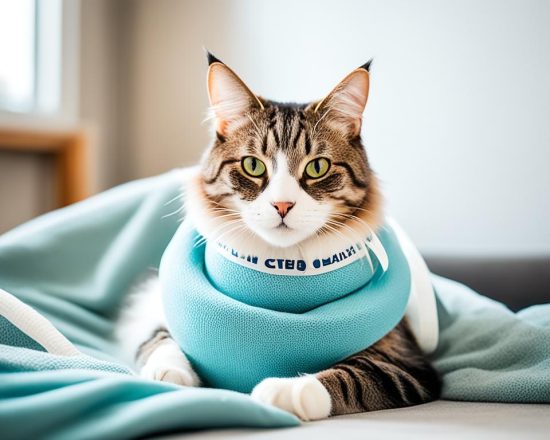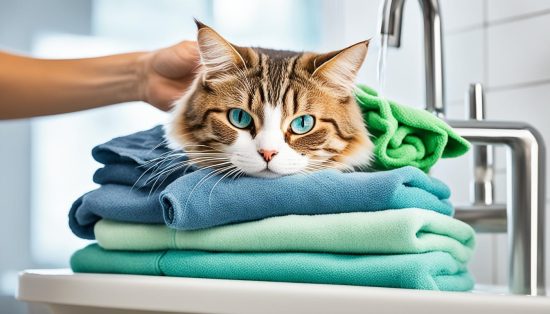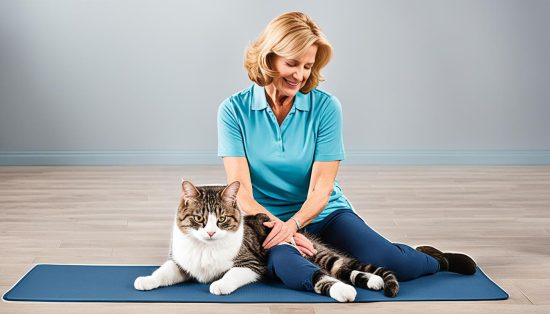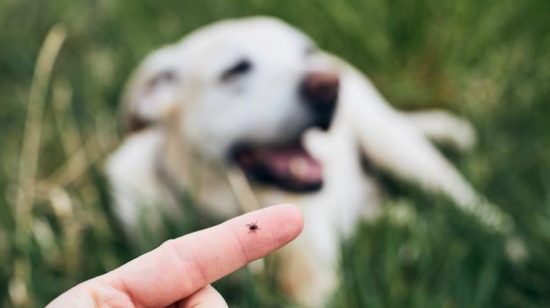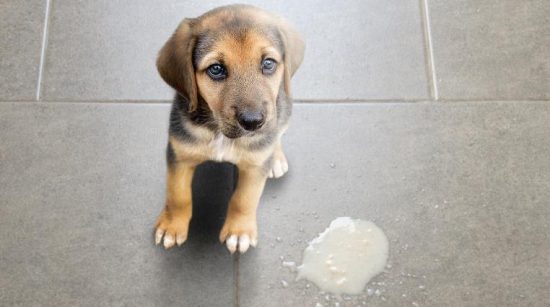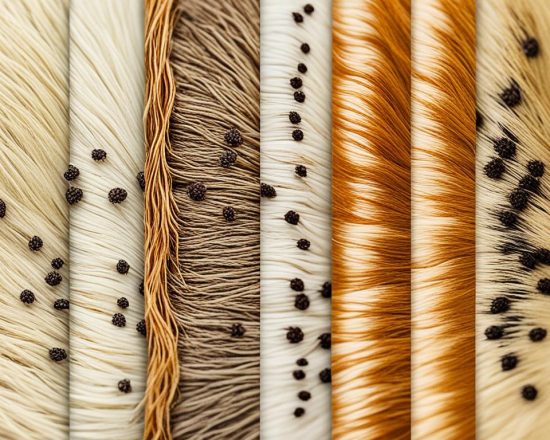How Big Do Maine Coon Cats Get? Exploring Their Size
Discover the majestic size of Maine Coon cats and learn what sets these gentle giants apart from other breeds. Explore their impressive stature now.
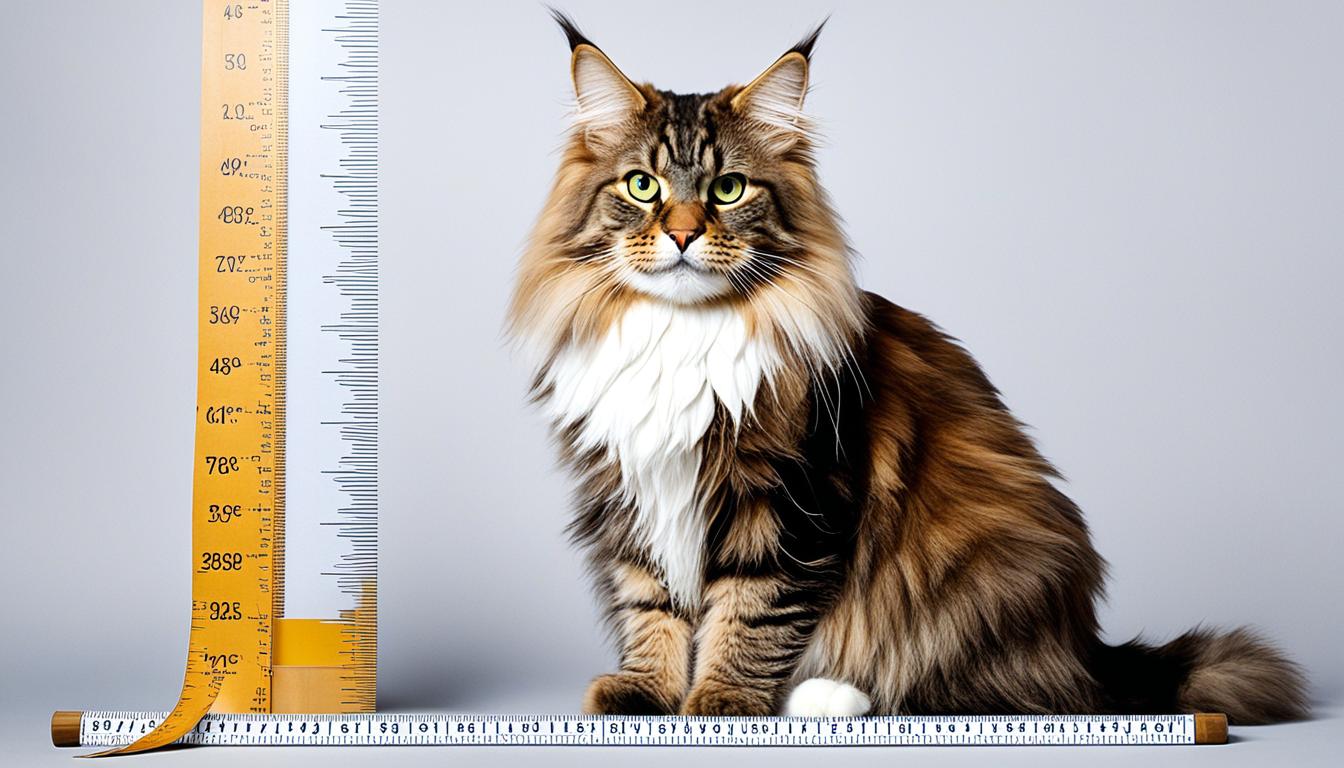
Did you know that the Maine Coon cat holds the Guinness World Record for being the largest domesticated cat breed? This gentle giant can reach astonishing sizes that will leave you in awe. We will delve into the size of Maine Coon cats and uncover the factors that contribute to their growth. From average weight, height, and length to the variations between males and females, we will provide valuable insights for potential owners and those curious about this majestic breed.
Understanding the Maine Coon Breed: Origins and Attributes
The Maine Coon breed is renowned for its distinctive characteristics that set it apart from other cats. These majestic felines are known for their large size, robust build, and muscular bodies. Fully grown Maine Coon cats can weigh anywhere between 9 and 18 pounds, with males typically being larger than females.
Maine Coon cats also have unique tufted ears, which add to their regal appearance. Their ears are adorned with tufts of fur, enhancing their overall charm. Additionally, Maine Coons are recognized for their bushy, plumed tails that are wider at the base and taper to a point. One of the most striking features of the Maine Coon breed is their captivating eyes. They come in a variety of colors, including amber, green, and gold. The shape and size of their eyes contribute to their expressive and gentle demeanor.
The Diverse Colors and Patterns of the Breed
Maine Coon cats exhibit a wide range of colors and patterns, making them a visually captivating breed. Their fur can be solid, with colors such as black, white, red, and cream. They can also have various patterns, including tabby, tortoiseshell, calico, and colorpoint. Aside from their base colors and patterns, Maine Coons can have unique markings such as lynx tips, where the fur on their ears has dark tips, resembling the tufted ears of a lynx. Some Maine Coons also have white patches on their chest, paws, or belly, adding to their distinctive appearance.
Maine Coon: The Gentle Giants of the Feline World
Despite their impressive size, Maine Coon cats are known for their gentle and friendly nature. They are sociable and enjoy the company of humans and other pets, making them an excellent choice for families. Maine Coons have a playful and curious personality, often engaging in interactive activities. They are highly intelligent cats that enjoy puzzle toys and interactive playtime. Their friendly nature and adaptability make them well-suited to various living environments, including apartments and houses.
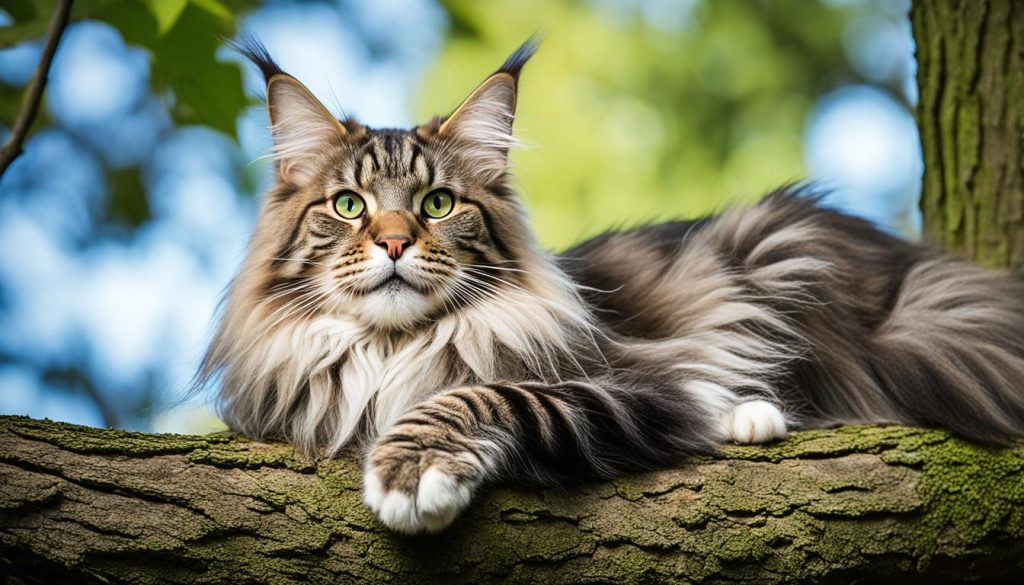
| Maine Coon Breed | Maine Coon Cat Characteristics | Maine Coon Cat Colors | Maine Coon Cat Patterns |
|---|---|---|---|
| Large size | Tufted ears | Black | Tortoiseshell |
| Tall and muscular build | Bushy plumed tail | White | Tabby |
| Expressive eyes | Gentle and friendly nature | Red | Colorpoint |
How Big Do Maine Coon Cats Get?
Maine Coon cats are known for their impressive stature, often regarded as one of the largest domesticated cat breeds. When fully grown, these majestic felines can reach significant dimensions in terms of weight, height, and length.
Let’s start with the average weight of adult Maine Coons. A full-grown Maine Coon typically weighs between 10 to 25 pounds (4.5 to 11.3 kilograms), with males generally being larger and heavier than females. These cats have a muscular build and a solid frame, contributing to their substantial weight.
When it comes to height, Maine Coons stand out among their feline counterparts. On average, a fully grown Maine Coon can measure anywhere from 10 to 16 inches (25 to 40 centimeters) in height at the shoulder. With their tall stature and strong, sturdy legs, these cats have an imposing presence that commands attention.
Another remarkable aspect of Maine Coon cats is their length. Adult Maine Coons can reach lengths of 40 to 48 inches (100 to 120 centimeters), measuring from the tip of their nose to the end of their tail. Their long bodies, combined with their fluffy fur, give them a remarkable elegance and grace.
It’s important to note that while these are general size ranges, individual Maine Coons may vary in size. The maximum size of Maine Coon cats can exceed the averages mentioned above, with some exceptional individuals weighing up to 30 pounds (13.6 kilograms) and measuring over 16 inches (40 centimeters) in height. However, it’s worth mentioning that these larger sizes are less common and not representative of the breed’s typical dimensions.
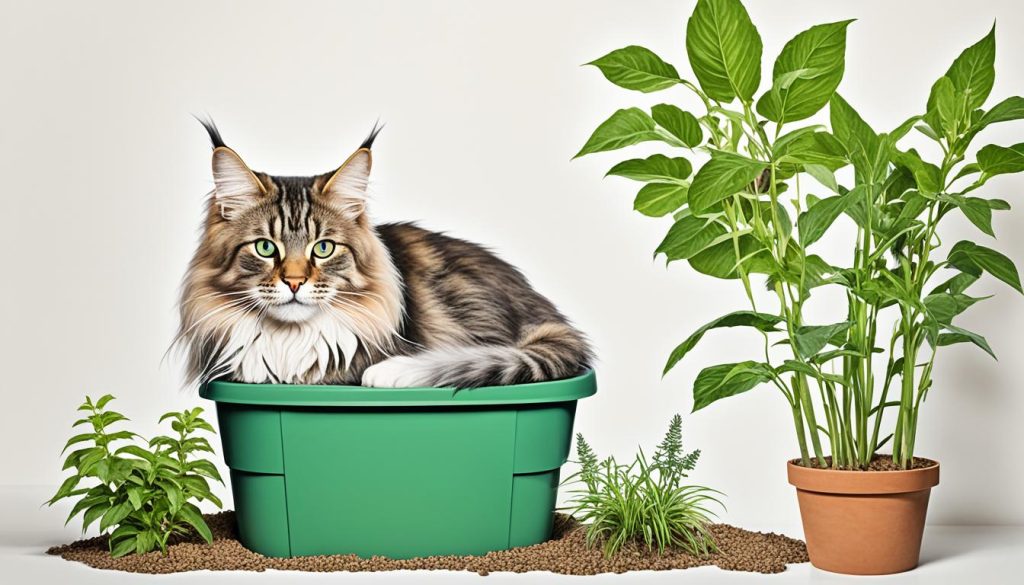
Comparative Size Analysis: Maine Coons Vs. Other Cat Breeds
Here, we will compare the size of Maine Coon cats to other cat breeds, focusing particularly on the Norwegian Forest Cat and Ragdoll cats. By exploring the similarities and differences in size, considering factors such as weight, height, and length, readers will gain valuable insights into how the Maine Coon’s size compares to other well-known feline companions.
The Norwegian Forest Cat: A Comparative Study
The Norwegian Forest Cat, also known as the “Skogkatt” in Norway, is renowned for its robust and athletic build. This breed shares many characteristics with the Maine Coon, such as a long, muscular body, tufted ears, and a thick coat. However, there are notable differences in their size.
On average, the Norwegian Forest Cat is slightly smaller than the Maine Coon. While both breeds can reach impressive sizes, Maine Coons tend to be larger overall. Adult male Maine Coons can weigh between 13 and 18 pounds, while their Norwegian Forest Cat counterparts typically weigh between 10 and 16 pounds. Similarly, Maine Coons can measure up to 16 inches in height, whereas Norwegian Forest Cats average around 14 inches. It’s important to note that individual variations within each breed can lead to exceptions to these average size ranges. However, when comparing the general size of Maine Coons and Norwegian Forest Cats, the Maine Coon often comes out as the larger of the two.
Ragdoll Cats: Similarities and Differences in Size
Ragdoll cats are another popular breed known for their docile temperament and striking appearance. When comparing the size of Ragdolls to Maine Coons, some similarities and differences emerge.
Both the Maine Coon and Ragdoll breeds are considered large cats, but Maine Coons tend to be bigger overall. Adult male Maine Coons can reach weights of 13 to 18 pounds, while male Ragdolls typically weigh between 12 and 20 pounds.
One notable difference between the two breeds is their body structure. Maine Coons have a more muscular and stocky build, while Ragdolls have a more laid-back and less dense physique. This difference in body composition contributes to the Maine Coon’s larger appearance.
Examining Size Differences in Long-Haired Breeds
When comparing the size of long-haired cat breeds, the Maine Coon often stands out as one of the largest. The combination of their size, dense fur, and robust build gives Maine Coons an impressive presence. Other long-haired breeds, such as the Norwegian Forest Cat and Ragdoll, also boast considerable size, but the Maine Coon tends to exceed them in overall dimensions. This size advantage contributes to the Maine Coon’s reputation as one of the largest domestic cat breeds.
It’s important to remember that size can vary even within the same breed. Factors such as genetics, diet, and overall health can influence an individual cat’s size and growth potential. When considering a cat’s size, it’s crucial to assess the overall well-being and characteristics of the specific cat rather than relying solely on breed averages.
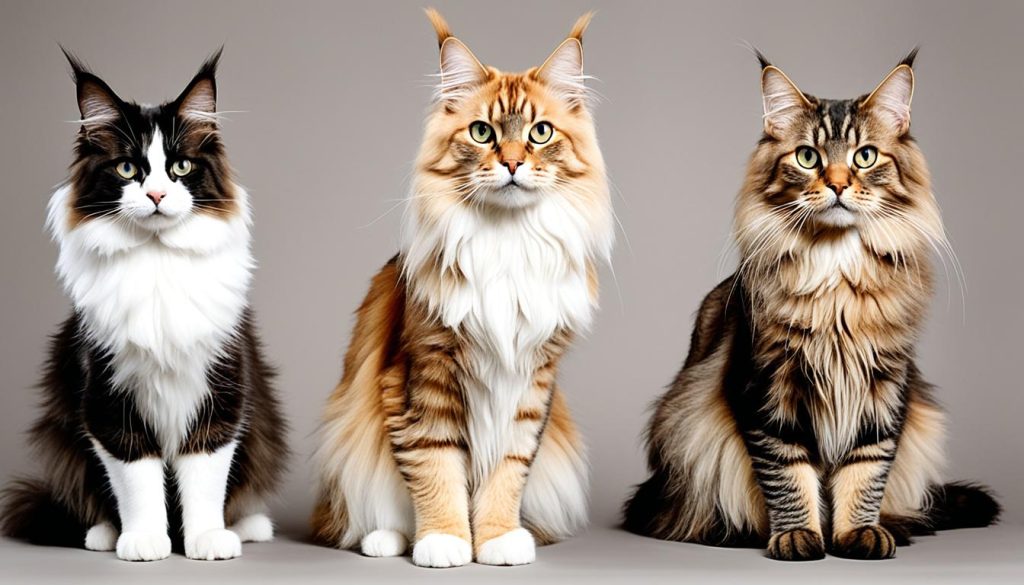
| Breed | Average Weight (Male) | Average Height (Male) |
|---|---|---|
| Maine Coon | 13-18 pounds | 16 inches |
| Norwegian Forest Cat | 10-16 pounds | 14 inches |
| Ragdoll | 12-20 pounds | Varies |
Maine Coon Growth Stages: Kitten to Adult
The growth stages of Maine Coon cats are a fascinating journey from their time as tiny kittens to their development into colossal adults. Maine Coon kittens are born small and vulnerable, weighing an average of 85-115 grams (3-4 ounces). As they grow, their size increases rapidly, and they quickly become larger than most other domestic cat breeds.
During the first few weeks of their lives, Maine Coon kittens go through a critical growth phase. They rely on their mother’s milk for nourishment and protection. As they reach their fifth week, they start exploring their surroundings and transitioning to solid food. At this stage, their size can double within a matter of weeks. By six months, Maine Coon kittens can weigh between 2.7-3.6 kilograms (6-8 pounds), and their bodies start taking on the distinct features of the breed.
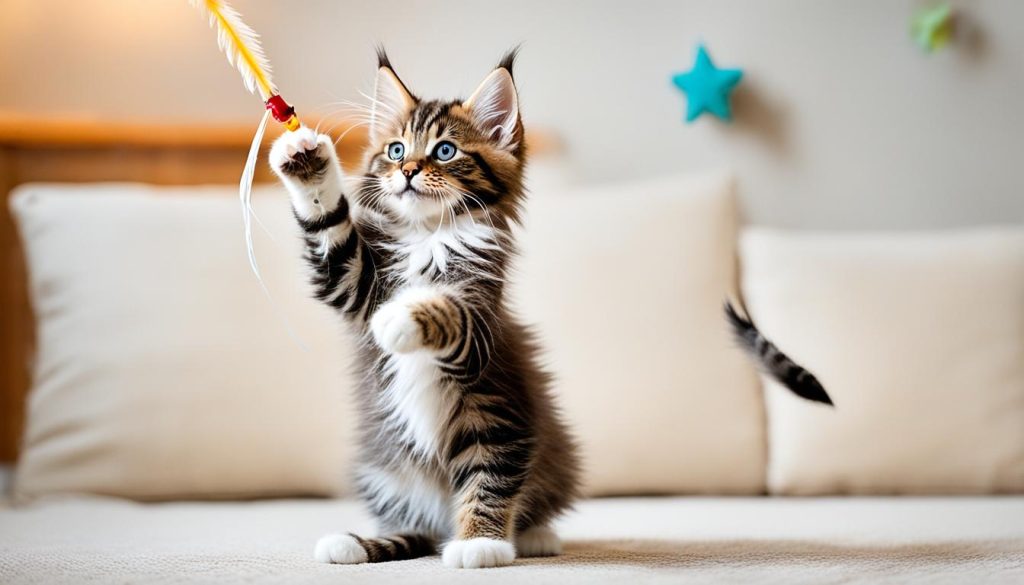
Adolescent Growth: The Rapid Development Phase
As Maine Coon cats enter adolescence, their growth rate continues to impress. Throughout this rapid development phase, their bodies undergo significant changes, both in size and appearance. Adolescent Maine Coons experience a growth spurt, and it’s not uncommon for them to gain 1-2 pounds per month during this period.
One of the most noticeable changes is the growth of their skeletal structure, leading to an increase in height and length. Their muscles also develop, giving them a robust and sturdy build. By the time Maine Coon cats reach their first birthday, they can weigh anywhere between 4.5-6.8 kilograms (10-15 pounds), and their growth starts slowing down.
It’s important to note that while Maine Coon cats reach their full adult size by around four years old, their overall development may continue until they are five years of age or even longer. The adolescent growth phase is crucial for shaping the size and proportions of this majestic breed, making it an awe-inspiring sight to behold.
| Growth Stage | Average Weight | Average Length | Average Height |
|---|---|---|---|
| Kitten (5-6 months) | 2.7-3.6 kg (6-8 lb) | – | – |
| Adult (1 year) | 4.5-6.8 kg (10-15 lb) | – | – |
| Full Adult (4 years+) | 8.2-12.7 kg (18-28 lb) | 101-122 cm (40-48 in) | 25-35 cm (10-14 in) |
The Role of Genetics and Care in Maine Coon Size Development
We will delve into the role of genetics and care in the size development of Maine Coon cats. Understanding the factors that contribute to the size of Maine Coon cats is essential for potential owners and those curious about this majestic breed.
Genetics play a significant role in determining the size of Maine Coon cats. These cats are known for their large size, and this can be attributed to certain genes passed down through generations. The presence of specific genes can affect their growth patterns, resulting in their impressive stature. Breeders carefully select individuals with desirable size traits to ensure the continuation of these hereditary factors.
Nutrition and Healthcare: Essentials for Growth
Supporting the size development of Maine Coon cats requires proper nutrition and healthcare. A well-balanced diet is crucial in providing the necessary nutrients for growth. Maine Coon cats have specific dietary requirements, and it is important to choose a high-quality cat food formulated to meet their nutritional needs. Additionally, regular veterinary care, including vaccinations, check-ups, and preventive measures, ensures the overall health and well-being of these cats.
| Type of Care | Description |
|---|---|
| Nutrition | Choose a high-quality cat food formulated for Maine Coon cats that meets their specific nutritional needs. Consider consulting with a veterinarian for personalized feeding recommendations. |
| Grooming | Regular grooming helps maintain the health and appearance of Maine Coon cats. Their dense, semi-long fur requires frequent brushing to prevent matting and remove loose hair. |
| Exercise | Maine Coon cats are active and playful. Providing them with ample opportunities for exercise, such as interactive toys and climbing structures, helps promote their overall well-being. |
| Veterinary Care | Regular veterinary check-ups, vaccinations, and preventive measures, such as flea and tick control, are essential for maintaining the health of Maine Coon cats. |
By understanding the influence of genetics and providing proper care, owners can support the healthy growth and development of their Maine Coon cats. It is important to consult with breeders, veterinarians, and other reputable sources for guidance on genetics, nutrition, and healthcare to ensure the best outcomes for these magnificent felines.
Living with a Maine Coon: Space and Accommodation Needs
When it comes to living with a Maine Coon, it’s important to consider their space and accommodation needs. These magnificent cats are known for their large size, and they require ample space to roam, play, and stretch their majestic bodies. Providing enough room for a Maine Coon to move freely is essential for their overall well-being and happiness.
Maine Coons are energetic and agile cats, so it’s crucial to create an environment that caters to their specific needs. One way to accommodate their size is by investing in tall and sturdy cat trees. These structures not only provide a place for your Maine Coon to climb and explore but also serve as a vertical territory for them to feel safe and secure.
In addition to cat trees, scratching posts are also essential for Maine Coons. These cats have strong scratching instincts, and having designated scratching areas will help protect your furniture and keep your Maine Coon satisfied. Opt for sturdy scratching posts made from materials like sisal or carpet to withstand the strength of a Maine Coon’s claws.
FAQs on how big do maine coon cats get
Are Maine Coon cats bigger than normal cats?
Yes, Maine Coon cats are generally larger than most domestic cat breeds. Their size is often compared to small dogs due to their robust build and impressive stature.
Is the Maine Coon the biggest cat breed?
While Maine Coon cats are one of the largest domestic cat breeds, they are not the biggest. The Savannah cat holds the Guinness World Record for the tallest domestic cat, while the Ragdoll is known for its significant size and weight.
Are Maine Coon cats good pets?
Maine Coon cats are often considered great pets for their friendly and sociable nature. They are known for their gentle temperament, intelligence, and love for human companionship. However, every cat has a unique personality, so it’s essential to spend time getting to know individual cats before adopting to ensure compatibility.
What are the weaknesses of Maine Coon cats?
While Maine Coon cats are generally healthy cats, they are prone to certain conditions such as hip dysplasia, hypertrophic cardiomyopathy (a heart condition), and spinal muscular atrophy. Regular vet check-ups, a balanced diet, and providing a stimulating environment can help prevent or mitigate these health issues.

